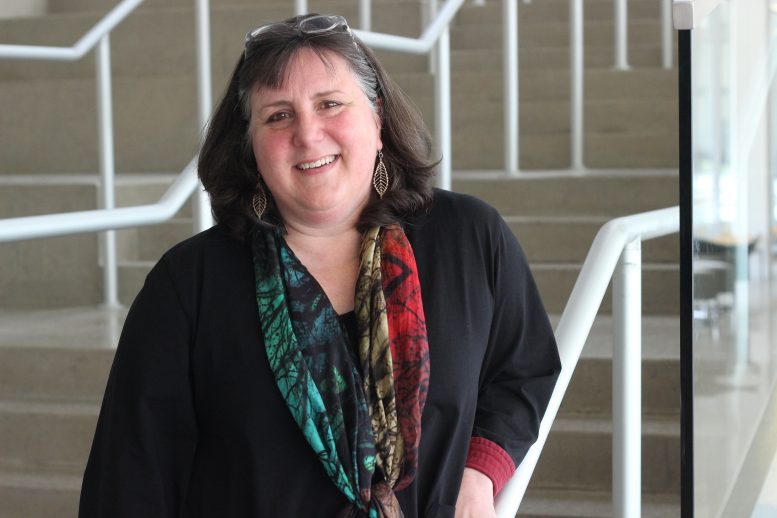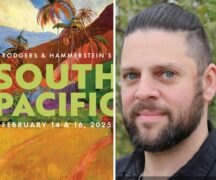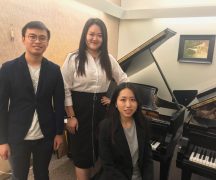By DAVID DUPONT
BG Independent News
Soprano Dawn Upshaw and pianist Gilbert Kalish share an easy rapport. That was evident Sunday night as they performed a recital in Kobacker Hall at Bowling Green State University.
They were entertain us, and it seemed each other. As Upshaw would say later, she likes to create a true “chamber” setting for the music “like we’re in a living room rather than a big hall.”
When Kalish played a solo piece, “The Alcotts” movement from Charles Ives’ second Piano Sonata, the singer stayed on stage and listened, enjoying the piece as much as the paying customers.
“It’s nice when one can enjoy one’s work,” she said in an interview on Monday.
Upshaw, one of the most renowned singers of our time, is on campus through Tuesday. Her Helen McMaster Endowed Professorship in Vocal and Choral Studies residency started Sunday with the evening recital, and continues through today (March 20) with a question and answer session at 1 p.m. in the Conrad Choral Room in the Wolfe Center, followed by a master class at 2:15 p.m.
She now heads the vocal arts program at Bard Conservatory in the Hudson River Valley, where she lives. “I’m very focused on that.”
That’s one of the reasons that Upshaw has cut back on her performing schedule. “I feel like it’s been great for my voice I don’t find I get vocally fatigued as when I was at the peak.
“I would love for my life to be a little simpler at this point,” she said. Anyone who has been at their profession for as long as she has will want to change.
Her career dates backs to 1984 when she was a member of the Metropolitan Opera’s Young Artist development program. She went on to perform in 300 productions. In 1992 she was the soloist in the landmark recording of Hendrik Gorecki’s “Symphony of Sorrowful Songs,” the rare contemporary music recording that sold millions. She’s won five Grammy Awards, most recently for “Winter Morning Walks,” a collaboration with composer Maria Schneider, who coincidentally will be in residence at BGSU next week.
As a teacher Upshaw said she emphasizes “a greater awareness of all the tools we have and how we use those tools to really connect with the music and what we think the music is really trying to say. I think finding the core meaning and being able to share that is of great importance.”
Vocalists must find “our core sound that is uniquely you.”
“I’m not sure we have much choice of what our sound is,” she said. “What we have to find is the depth. That’s one’s own private work. Teachers help to find routes to it. It takes … listening to your voice and your body and using your body without tension.”
Working with soprano Alissa Plenzler in Monday afternoon’s master class, Upshaw encouraged the graduate student to work on the vowels in the French song she was performing. That was one way for her to find her core voice.
Upshaw told the master class that French was a language she had difficulty mastering, yet she ended up singing a great deal in French.
On Sunday night’s recital, much of the program was in English. She did open with five German songs by Franz Schubert.
Schubert’s songs are a pillar of the art song repertoire. She and Kalish have recently brought back this set into their programs. She also performed a set of folk song settings by Bela Bartok. As lovely as the songs are, they are not often done because of the perceived difficulty of the Hungarian text. Still the composer set hundreds of them and she’d like to explore more. The final one of the set the playful “Six Forints” Song had her clearly admiring Kalish’s vigorous execution of the complex rhythms.
Kalish’s solo piece led to several deeply nostalgic songs by Ives. The recital also included music by Sheila Silvers and Rebecca Clarke, both 20th century composers. Upshaw was pleased to include work by women on the program.
The rapport between the singer and pianist was especially evident on the closing set of theater songs by William Bolcom, including the tale of the vaguely sinister, vaguely reassuring “Black Max” and the light-hearted story of the transvestite “George” that ends in tragedy. Together they dramatized these deep, yet appealing songs.
“Gil and I have known each other since 1988 when we first began working together. It wasn’t anything we had to work at. When it’s right, it’s kind of organic.”
Upshaw continued: “I liken it to having easy conversation with someone on a subject of value and meaning. It’s amazing how much of one’s personality shows up in one’s music making. There have been times I’ve worked with spectacular musicians, but haven’t felt that connection. That connection is really important to me and to any professional collaborative musician.”
She and Kalish do more than duo work together. Recently they toured with a piece composed for them and So Percussion by Caroline Shaw.
“I enjoy finding those special moments to make music with my favorite colleagues. I still enjoy singing.”
Looking to the future she plans to continue to perform. “I’m still eager to work on new music. Perhaps there’ll be a new collaboration.”





